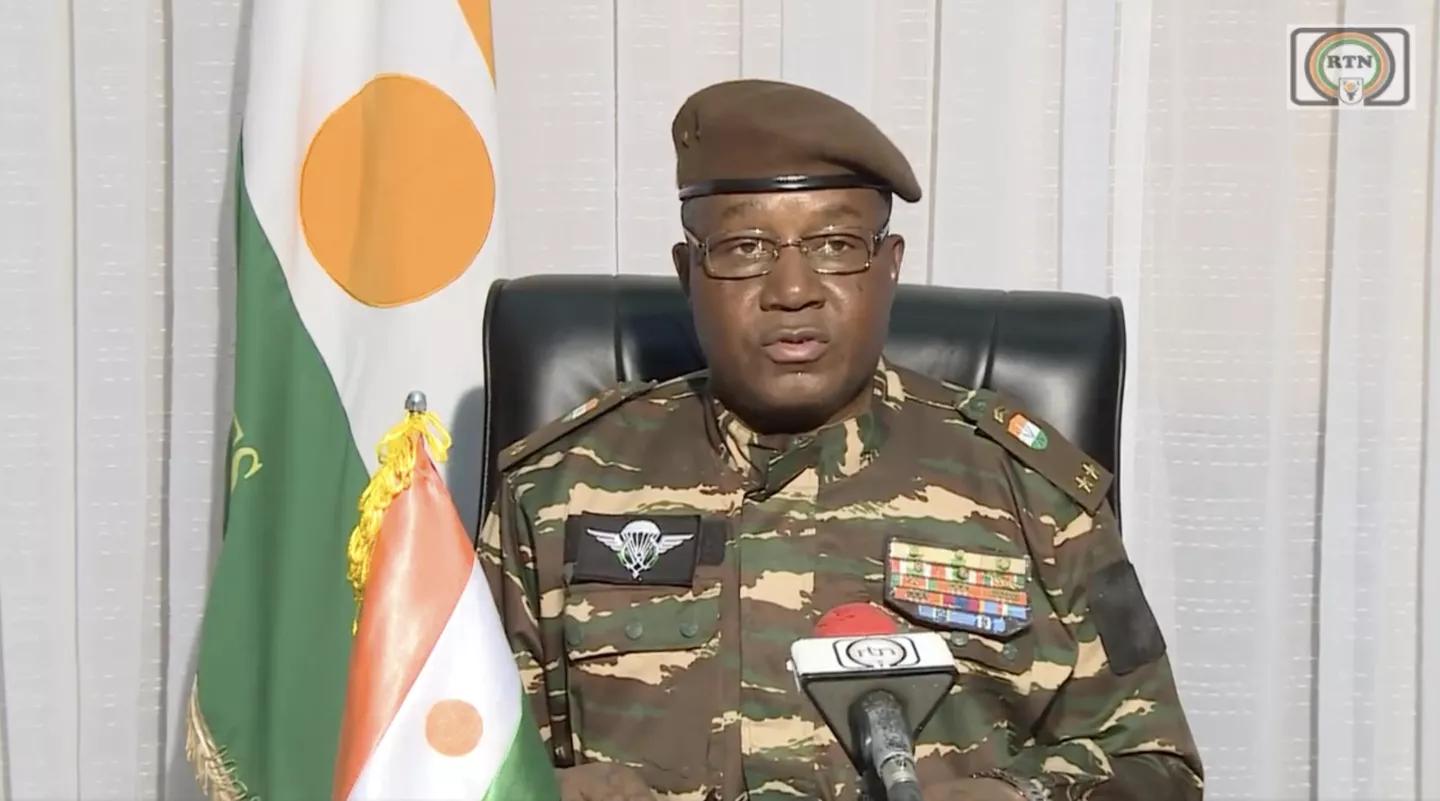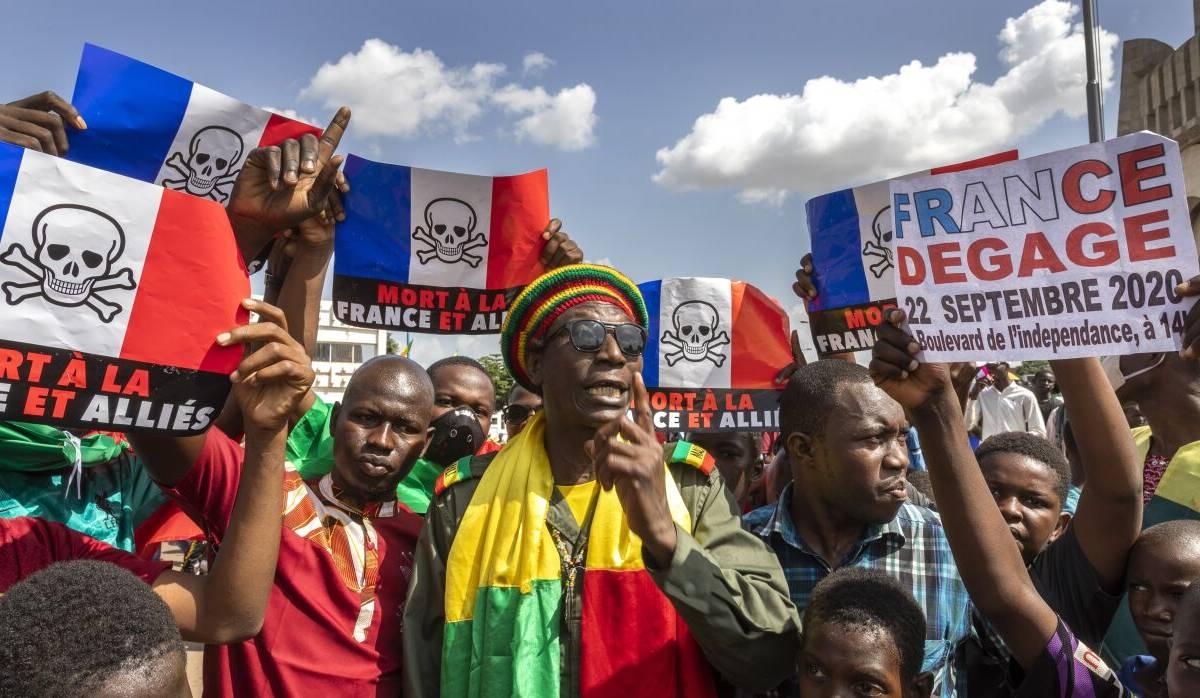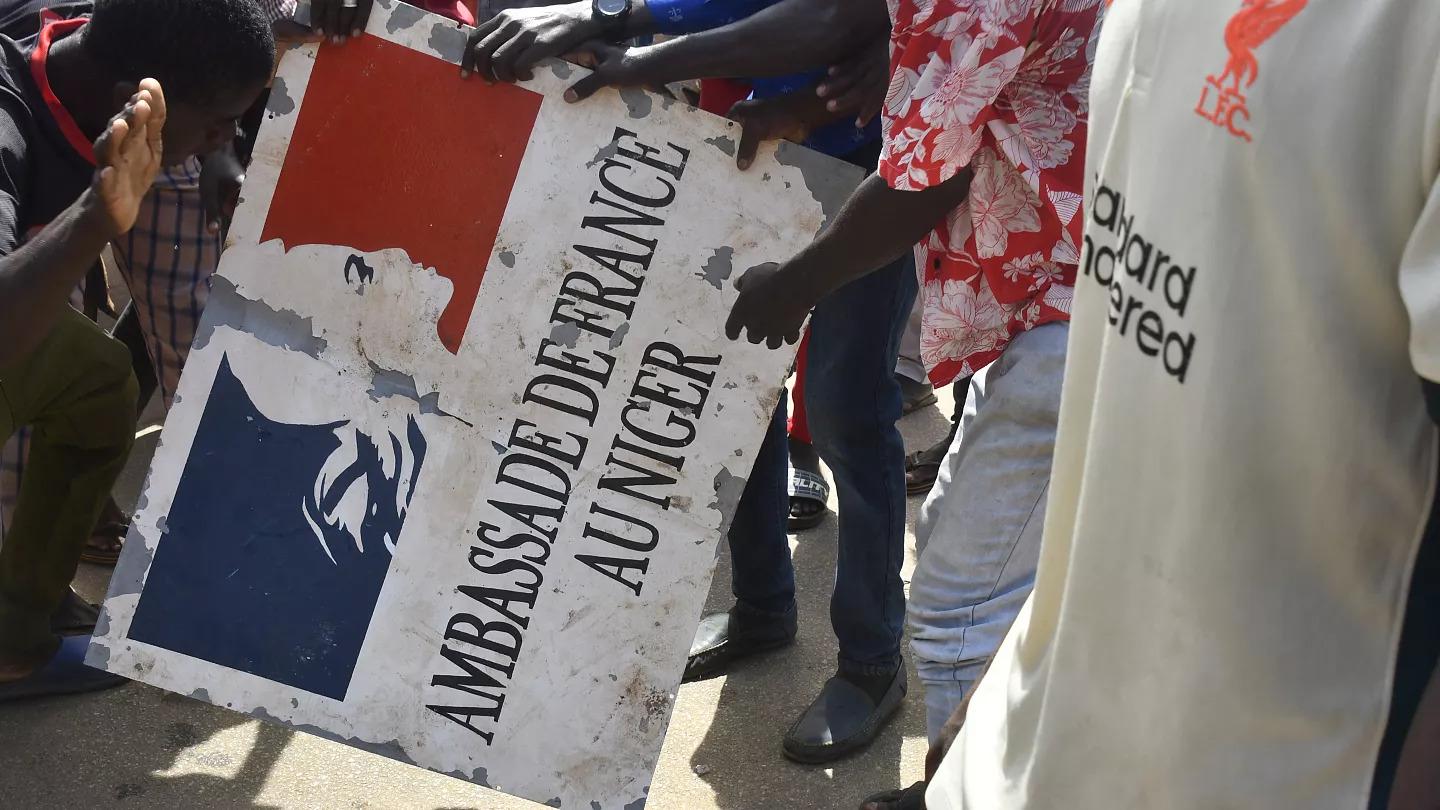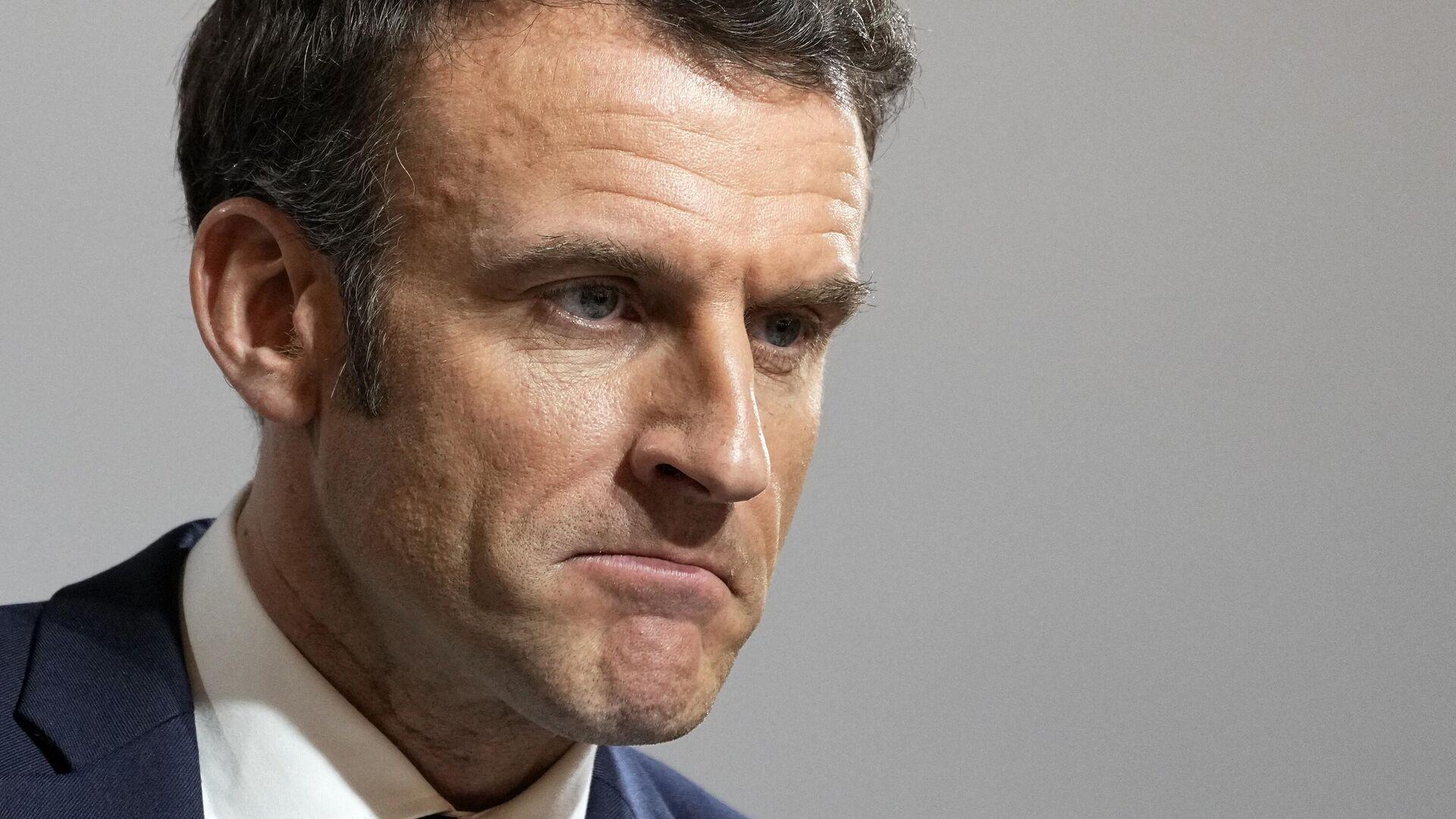Crumbling Colossus: Africa throwing off France's colonial shackles Sahel Alliance gives Macron his walking ticket
More recently, West Africa has been the scene of another phase in the struggle for the complete eradication of the colonial legacy of the past.
Imperial legacy burden
At the end of January, the leaders of Mali, Niger and Burkina Faso announced their withdrawal from the Economic Community of West African States (ECOWAS). ECOWAS was founded in 1975 by 16 West African states. Its official aim is economic and military cooperation and mutual assistance. Why are Niger, Mali and Burkina Faso now unhappy with the West African Union? ECOWAS had "distanced itself from the ideals of its founding fathers and Pan-Africanism", according to a press release announcing the three states' withdrawal. The bloc was also accused of having imposed "inhumane sanctions" in order to provoke coups d'état in Burkina Faso, Niger and Mali.
Burkina Faso's Prime Minister Apollinaire Joachim Kyélem de Tambèla described the decision as "historic and considered", following a thorough analysis of the union and the consequences of leaving it. According to the Burkina Faso Prime Minister, ECOWAS has become an instrument of technocracy, indifferent to the humanitarian crisis and incapable of helping in the fight against terrorism.
The countries of West Africa are rich in natural resources. Niger has uranium (the fifth largest in the world in terms of production), gold, gas and oil; Burkina Faso has gold, nickel, titanium, phosphates, manganese and copper; Mali has gold (the third largest in Africa). But even after their colonial systems collapsed, Western companies tried to monopolise exploiting them. The people of these countries have generally received only crumbs from the exploitation of their natural resources.
Within the framework of ECOWAS, the former metropolis continued its neo-colonial "France-Africa" project. For almost sixty years, French companies such as Bolloré, Total and Orano have dominated the region. Times are changing, though. In May 2021, a transitional regime was installed in Mali under the leadership of Colonel Assimi Goita, who was brought to power not only by the army but also by a strike by the National Union of Workers of Mali. Since 2022, Burkina Faso has had a transitional military government led by Captain Ibrahim Traoré, leader of the Patriotic Movement for Reconstruction and Reconciliation. In July 2023, the National Council for the Defence of the Homeland, led by Brigadier General Abdourahamane Tchiani, also took power in Niger with the help of the military. The new authority's commitment to economic sovereignty threatened French control of uranium resources. ECOWAS then imposed economic sanctions and threatened a military invasion of Niger if "constitutional order" was not restored. The ultimatum gave Abdourahamane Tchiani a week to think.

However, the coalition was divided and not all ECOWAS members decided to obediently follow what France wanted to happen. The Nigerian Senate refused to give its approval to a military intervention in the affairs of its neighbours, and Cape Verde took a similar position. According to media reports, the invasion of Niger was also divisive in Senegal. But even more sobering were statements by Mali, Burkina Faso and Guinea (which also suspended its participation in ECOWAS) that their armies would side with Niger in the event of aggression. The promised ECOWAS intervention never materialised. Nor did the instigating France, extremely unhappy at the loss of its position in the region, dare to intervene.
Nor did President Macron have the support of his strategic ally, the United States. On August 7, 2023, Victoria Nuland, the US undersecretary of state for political affairs, arrived in Niger for talks with the leaders of the National Council. However, according to experts, the main purpose of the US Assistant Secretary of State's visit was to disrupt Niamey's looming close alliance with Russia. It was also intended to ensure a greater presence of US capital in the region. In the latter case, the Fifth Republic's failures in former colonies were very much in American hands. On August 14, 2023, the newspaper Le Figaro explicitly expressed its doubts on this point: "France fears that its American ally may overtake it".
Colonial syndrome
At the same time, even today, France is probably the country closest to the classic model of a colonial empire. It probably seems to many inhabitants of the planet that the era of colonialism is far in the past since the inhabitants of Africa are no longer being transported in the holds of slave ships. But the slave trade still exists, albeit in a modified form. Most importantly, some Western countries have never fully withdrawn from their former colonies. France in particular. To this day, France still has the largest number of real colonies - French Guiana, French Polynesia, Guadeloupe, Martinique, New Caledonia, and 13 overseas territories in all. At the same time, Paris has more overseas possessions in terms of area and population than any other Western colonial power. And that is not counting Corsica, the problem of which we are not going to touch on in this article.
Paris is also trying to keep the former colonies which became independent within its direct sphere of influence. Only the former chains of slavery have been replaced by other instruments, mainly financial and economic subjugation. However, violent control and direct military intervention are still not ruled out. This is, among other things, the "gratitude" of Paris for the great role played by African colonial troops in liberating France and some other European countries from Nazism and Fascism.
As a result, the economies of 15 West African states were placed under the control of the Bank of France after they gained sovereignty in the early 1960s. Their governments were obliged to deposit a substantial part of their foreign currency in this former metropolitan financial institution, without being entitled to dispose of it in full. Settlements continued to be made in a special currency, the colonial CFA franc. Significantly, this abbreviation was originally translated as "Colonial Franc of Africa", but was then replaced by a more politically correct decoding - "African Economic Community".

In 2019, the summit of the Economic Community of West African States (ECOWAS) decided to replace the CFA franc with a new regional currency, the ECO. However, the conditions for the transition to the new unit of account were in the spirit of the requirements of hard monetarism: budget deficit of less than 3 per cent of GDP, inflation of less than 10 per cent, foreign exchange reserves covering 3 months of imports. In essence, this was similar to the standard IMF and World Bank requirements that had been in place in Africa for some 40 years, and which had led to very disastrous results, including wage and social cuts. France was counting on another renaming of its colonial franc, but American corporations were hoping that they would be more successful in penetrating the region with a new currency. For the people of West Africa, however, neither the old colonial franc nor the new currency made any difference.
Even Paris, which prides itself on its democratic values, initially supported the local putschists. For example, the former president of Niger, General Yakubu Gowon, and the president of Togo, General Gnassingbe Eyadema, who were among the founders of ECOWAS, themselves came to power through military coups. At the time, however, France did not question the fact that military dictatorships were involved in the creation of the union. Moreover, Gnassingbe Eyadema, a former member of the French army who is said to have personally assassinated his predecessor as president, has twice led ECOWAS.
And France itself has resorted to armed force on several occasions to maintain order in the region. Since the late 1950s, the French army has carried out some 40 major military operations in Africa. Of course, all these military actions were primarily carried out in the interests of regimes loyal to Paris and French companies extracting African resources. In fact, a new system of oppression by the former metropolis has been set up on the "black continent", only in a more sophisticated way. At the same time, French paratroopers and the Foreign Legion marched across Africa not only at a time when the colonial system was collapsing. In the 21st century, the French have already carried out 11 major security operations, including the invasions of Mali and the Central African Republic and the aggression against Libya. In 2014, for example, French forces were on the ground in Mali, Chad, Burkina Faso, Mauritania and Niger as part of Operation Barkhan. But the progressive-minded military taking over in Mali, Niger and Burkina Faso posed a serious challenge to the Elysee Palace. The leaders of these countries, Assimi Goita, Ibrahim Traoré and Abdourahamane Tchiani, called for the closest possible cooperation between their states. The creation of the Alliance of Sahel States (AES) was announced on September 16, 2023.
The creation of this economic and military defence alliance could be a real anti-imperialist revolution in the region. At the end of November, the economic and finance ministers of these countries announced their intention to create a stabilisation fund, an investment bank and to consider a monetary union. And in early December, the foreign ministers signed a declaration of intent to create a confederation of Niger, Mali and Burkina Faso. Today, further practical steps are being taken in this direction. Already on February 16, 2024, the defence and foreign ministers of the Sahel Alliance met in Ouagadougou, the capital of Burkina Faso, in preparation for a summit of heads of state for the creation of the confederation. At the meeting, the ministers reiterated that ECOWAS had strayed from its main objective of serving the people, and that "this decision is irreversible and irrevocable". It was also noted that Captain Traoré's views on the further integration of their countries were very important to the experts.
Captain Ibrahim Traoré, the leader of the transitional regime in Burkina Faso, is seen by many of his country's citizens as the reincarnation of the legendary leader of "African socialism", Thomas Sankara. Captain Traoré prefers to act and appear in Sankara's style. On February 17, a popular mass meeting was held in Ouagadougou, attended by representatives from 13 regions of the country, and activists from the National Coordination of Civil Observation. This movement is a link between the transitional military government and the population. Captain Traoré addressed the meeting, and people from the region welcomed him and expressed their concerns and criticisms.
But the opponents of the current transitional regime and its new course are not laying down their arms either. In the truest sense of the word. According to the Burkina Faso authorities, there have been four coup attempts in the 15 months of military rule. The latest was to have taken place on January 14, when a group of active and retired military officers and activists from some externally funded NGOs were to have staged a coup d'état. Of course, these are not the last actions of this kind with the encouragement of foreign countries.
Economic decolonisation
However, the response of the young states of the Sahel to all the challenges of neo-colonialism was primarily peaceful economic initiatives. At the same time, ECOWAS members themselves were soon of the opinion that sanctions against "rebellious" states were not in their own interests. On December 10, ECOWAS announced the possibility of easing sanctions against Niger, linking this to a "short-term transition" to the establishment of civilian authority. On December 23, Benin's President Patrice Talon said he wanted to "quickly restore relations" with his neighbours. The fact is that Benin's seaports have seen their revenues plummet following the suspension of transit to Niger.
Economic cooperation between the region's states is now regaining momentum. At a meeting of energy ministers in the Nigerian capital Niamey on February 17, an agreement was reached to supply diesel fuel from Niger to Chad, Mali, Burkina Faso and possibly Togo. And at the end of last year, Niger inaugurated a major pipeline of almost 2,000 kilometres for the first shipments of its oil to neighbouring Benin, terminating at the port of Cotonou. With this $4 billion investment in oil exploration and $2.3 billion in this pipeline, Niger will increase its oil production to 110,000 barrels per day, of which 90,000 barrels will be exported. The project is being financed by PetroChina, a Chinese company that produces oil on a parity basis with Niger. Niger's new transitional government has already declared that the revenues from these oil supplies will be used primarily for the country's sovereignty and development, and will be distributed fairly among the population.
On February 17, finance ministers meeting in Niamey also adopted a roadmap for the implementation of the "Desert to Energy" project, initiated by the African Development Bank (ADB) under the auspices of the Organisation of African Unity (OAU). With an investment of $20 billion, the project is expected to bring electricity to 250 million people in the Sahel. It will make the Sahel the world's largest solar energy production zone. The "Desert to Energy" project involves 11 countries - Burkina Faso, Niger, Ethiopia, Eritrea, Djibouti, Mali, Mauritania, Nigeria, Senegal, Sudan and Chad.
Today, less than a quarter of Burkina Faso's population has access to electricity. But after breaking off relations with France, Burkina Faso signed an agreement with the Russian Federation to build a nuclear power plant in October 2023. Russia's Nordgold, which already operates three mines in the north of the country, has also been granted permission to develop another deposit.

On February 12, Niger's Head of State, Brigadier General Abdourahamane Tchiani, said that there was an urgent need to restore full sovereignty - the creation of a single currency for the Alliance of Sahel States. "We have to do a clean sweep of the recent history of African states. It is no longer possible for our states to be the cash cow of France ... France has plundered us for more than 107 years, France must pay the debt it owes for systematically plundering our resources in cash, and we will find a timetable so that we can be even with France. The currency is a step away from this colonisation, there are experts in the AES states and at the appropriate time we will take a decision, Inshallah".
The Alliance of Sahel States' action against economic colonialism has the support of both workers' representatives and national businesses. Small and medium-sized enterprises believe that liberation from global corporations and regional integration will allow them to develop more successfully. Of course, the other alternatives to the French monopolies do not have humanitarian missions in West Africa. But with diversified choices and "economic multi-vectorism", young states may have a better chance of truly developing sovereignty and respecting national interests.
New forces
For the Alliance of Sahel States, the struggle for cultural independence is no less important. They believe that francophony was one of the tools of colonial domination. In December 2023, the government of Burkina Faso passed a bill to revise the constitution and enshrine the national languages as official languages. French would remain only as a "working language". Similar measures were taken earlier in Mali.
And it is certainly difficult to talk about national independence in the shadow of foreign military bases. One of the main reasons for the presence of French troops in the region was the fight against terrorism. Illegal armed groups, for example, were active in most parts of Burkina Faso. Terrorists have killed 17,000 people in recent years, and more than two million have become internal refugees. But today, the people of West Africa have repeatedly seen the ineffectiveness of such a fight against terrorism on the part of the French, as evidenced by a series of failures of their military operations. And the "fight against terrorists" is still only used as a cover for the presence of its army in sovereign African states.
That is why in August 2023 a massive popular demonstration took place in front of the French base in Niamey, where 1,500 soldiers were stationed, demanding the withdrawal of foreign troops. The National Council for the Defence of the Homeland then broke the military agreement with France and demanded the evacuation of the armed contingent by September. The Macron government initially called this demand "unacceptable", but was soon forced to comply.

The Sahel Alliance hopes that its combined efforts can overcome terrorism. In November 2023, the Malian army liberated the town of Kidal in a successful operation for which Captain Traoré congratulated the leader of Mali's transitional regime, Colonel Assimi Goita. The Burkina Faso leader expressed his hope that "the member countries of the African Economic Community will overcome terrorism in a seamless alliance".
Burkina Faso is negotiating military cooperation with the Russian defence ministry. The Burkina Faso media also note ironically that the French-influenced ECOWAS and its military structure have never had the strength to fight terrorism, but have found it to fight "putschists".
Today, the Alliance of Sahel States considers the diversification of partnerships as one of the main principles of its foreign policy. This means developing economic, political and military ties not only with Western countries but also with all other countries, including the newly powerful leaders of the Global South. The alliance seeks to move away from the dominance of the dollar and the euro and links its future to the growing potential of the BRICS.
Needless to say, the old colonial empires do not like this new dynamic at all. The same France is trying to compensate for another setback in its former colonies by intensifying its policies in other regions. In particular, by fuelling conflicts and contradictions in the South Caucasus.
But the processes taking place in Africa and throughout the Global South are not the arbitrariness of individual leaders or political forces, but an objective reflection of economic reality and new development trends. In recent years, China, Russia and Türkiye have significantly stepped up economic cooperation with a number of African countries, challenging the dominance of Western corporations. New poles of economic attraction are emerging, and their growing influence will inevitably change our world in the near future.








